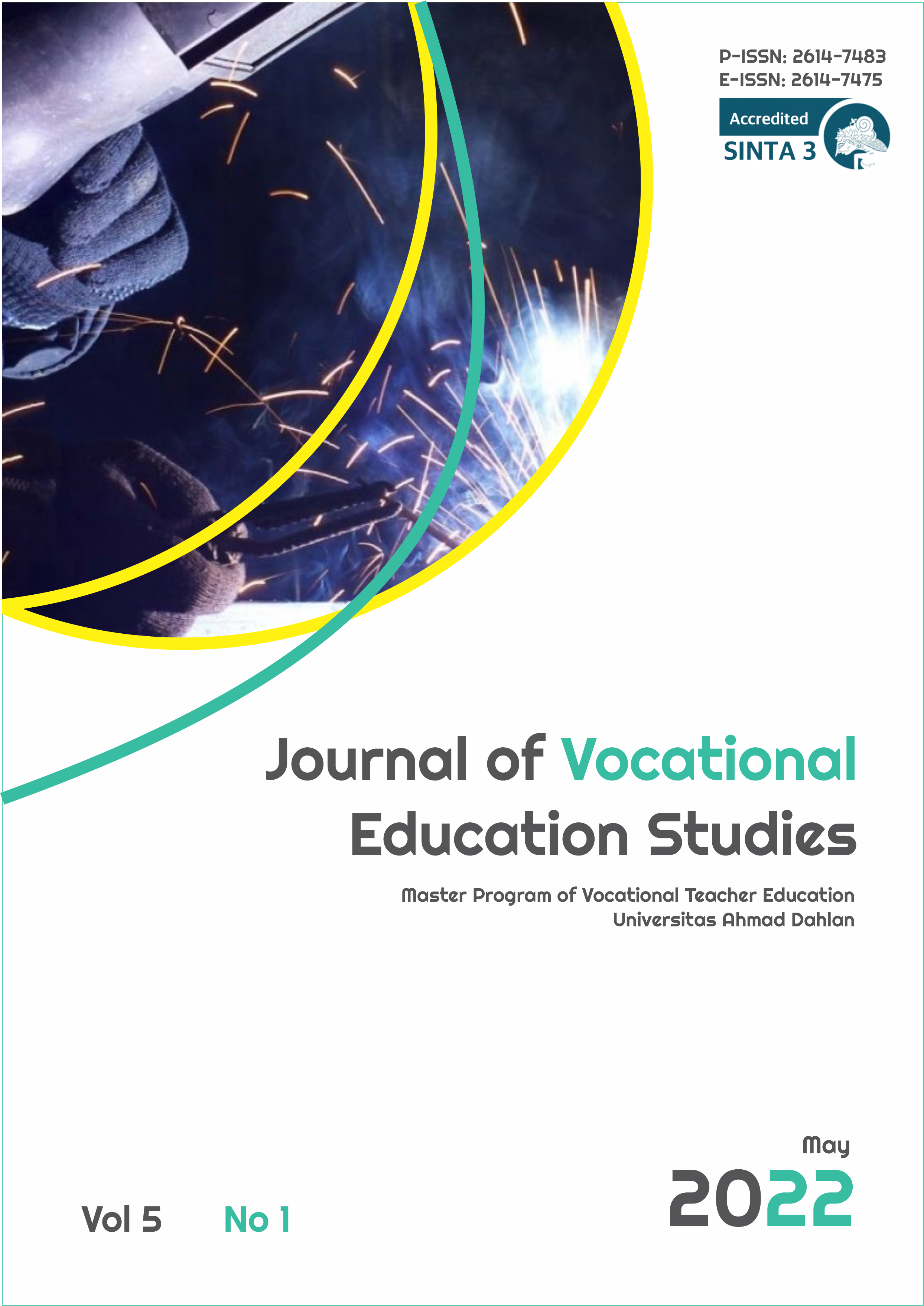Repositioning Vocational and Technical Education in Nigeria: Work-Based Versus Work-Place Learning and Skill Acquisition Order
DOI:
https://doi.org/10.12928/joves.v5i1.5891Keywords:
work, vocational and technical education, work-based, work-place, learning, skill acquisitionAbstract
Vocational and technical education (VTE) is a stratum of education system that deals directly with acquisition of skills for work. Nigeria’s National Policy on Education (NPE) in Section 7 Numbers 40 to 57 expansively stresses the need for VTE with a view to producing formidable workforce with relevant vocational and technical competences necessary for sustainable national development. On this premise, this paper underscores repositioning VTE in Nigeria. This article conceptually explores the similarities as well as the differences between work-based learning and work-place learning. How these two concepts result into vocational and technical skill acquisition with their attendant demands forms a major section of this paper. The paper views that if the opportunities for job skills acquisition offered by work-based and work-place learning could be purposively harnessed into the nation’s educational programme, the ever-rising unemployment rate in the country would drastically be alleviated.
References
Abdulrahaman, W. L. (2013). Technical and Vocational Education, A Tool for National Development in Nigeria. Mediterranean Journal of Social Sciences. 4 (8): 85-89.
Adebisi, T. A. (2012). Implementation of Policy on Adult and Non-Formal Education Programmes in Nigeria: A Critique of National Policy on Education. Educational Periscope. A Publication of Nigerian Association of Educationists for National Development (NAEND). 4, 41–52
Adebisi, T. A. (2013). Child Labour: A Potential Challenge to Vocational Skills Acquisition. Journal of the Collaboration of Education Faculties in West Africa. 2(2): 128-135
Adeyemi, I. A. (2019). Nigerian Universities are suffering from Neglect. Why this should stop. The Conversation. Retrieved from https://theconversation.com>nigerian-universities-are-s.
Becker, K. (2007). Digital Game-Based Learning once Removed: Teaching Teachers. British Journal of Educational Technology, 38(3): 478-488
Billet, S. (1995). Workplace Learning: Its Potential and Limitations. Retrieved from: https://www.researchgate.net/publication/235298670_workplace_learning_its_potential_and_limitations.
Billett, S. (1998). Constructing Vocational Knowledge: Situations and other Social Sources. Journal of Education and Work, 11(3): 255-273
Ismail, S., Omar, M. N. & Kiong, Y. T. (2015). A Comparison of the Work-Based Learning Models and Implementation in Training Institutions. Procedia Social and Behavioural Sciences. Vol. 204, 282-289.
Mikkonen, S., Pylvas, L., Rintala, H., Nokelainen, P. & Postareff, L. (2017). Guiding Workplace Learning in Vocational Education and Training: A Literature Review. Empirical Research in Vocational Education and Training volume 9, Article number: 9 (1): 1-22
Moise I. A., Teodora P., Kadar, M. & Muntean, M. (2013). Developing Students’ Educational Experiences through Work-based Learning Programmes. Procedia-Social and Behavioural Sciences 93(2013) 1045-1049 www.sciencedirect.com
Mutie, P. M. (2007). Addressing Child Labour through Vocational Training: Kenyan Experience. Institute of Development Studies: University of Nairobi
Nathaniel, M., Lawson, E. F. & Obed, O. O. (2019). Strategies for Enhancing Vocational Skills Acquisition by Students in Ignatius Ajuru University of Education, River State. International Journal of Innovative Social & Science Education Research 7(4): 31-39.
Nwachukwu, P. O. (2014). Funding Education for Sustainable Development in Nigeria: Challenges and the Way Forward. Journal of Education and Practice, 5(20): 51-56.
Ortiz, E. A., Kaltenberg, M., Jara-Figueroa, C., Bornacelly, I. & Hatmann, D. (2020). Local Labor Markets and Higher Education Mismatch: What is the Role of Public and Private Institutions? IDB Working Paper Series No IDB-WP-01115. Retrieved from https://publications.iadb.org>english>document/pdf
Rosin, D. & Hyland, T. (2003). Group Work-Based Learning within Higher Education: An Integral Ingredient for Personal and Social Development of Students Education. Journal Articles Paper 2. Retrieved from: http://digitalcommons.bolton.ac.uk/ed_journals/z
Tynjälä, P. (2013). Toward a 3-P Model of Workplace Learning: A Literature Review. Voc Learn 6(1):11–36
Veal, K & Dunbar, M. (2018). Work-based Learning for Skills Development. Retrieved from https://development.asin>explainer>work-based-learn.
Vukotic, S. & Vojnovic, B. (2019). Training and Work Skills Acquisition in Modern Business. Retrieved from https://www.researchgate.net>publication>337658054
Downloads
Published
Issue
Section
License
Copyright (c) 2022 Universitas Ahmad Dahlan

This work is licensed under a Creative Commons Attribution-ShareAlike 4.0 International License.
Authors who publish with Journal of Vocational Education Studies (JOVES) agree to the following terms: Authors retain the copyright and grant the Universitas Ahmad Dahlan right of first publication with the work simultaneously licensed under a Creative Commons Attribution License (CC BY-SA 4.0) that allows others to share (copy and redistribute the material in any medium or format) and adapt (remix, transform, and build upon the material) the work for any purpose, even commercially with an acknowledgement of the work's authorship and initial publication in Universitas Ahmad Dahlan. Authors are able to enter into separate, additional contractual arrangements for the non-exclusive distribution of the journal's published version of the work (e.g., post it to an institutional repository or publish it in a book), with an acknowledgement of its initial publication in Universitas Ahmad Dahlan. Authors are permitted and encouraged to post their work online (e.g., in institutional repositories or on their website) prior to and during the submission process, as it can lead to productive exchanges, as well as earlier and greater citation of published work (See The Effect of Open Access).










.png)



